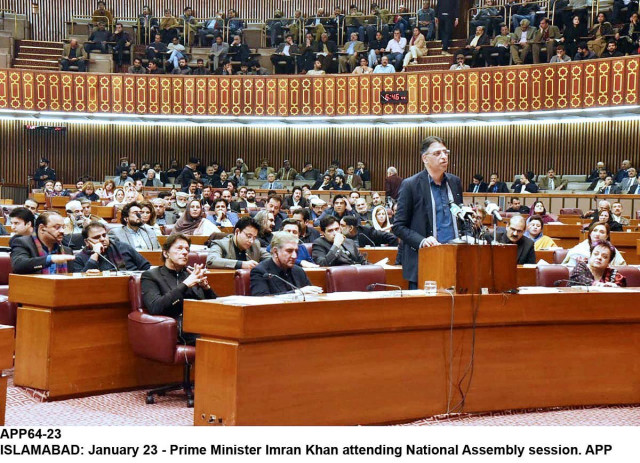Second mini-budget: Tax cuts, incentives to boost growth
Finance minister Asad Umar says balance of payment crisis and budget deficit are big challenges

Mini-Budget presented by Asad Umar on Jan 23, 2019: PHOTO:APP
Presenting a package of financial measures on in the National Assembly, about four months after presenting the first mini budget for the fiscal year 2018-19, the minister announced Rs6.8b measures to attract investment and to boost industry, agriculture and small and medium enterprises (SMEs).
The finance minister told the house that the big challenge for the new government was to deal with a balance of payment crisis and budget deficit. He added that government sought help from friendly countries to tackle the balance of payment crisis and took some measures for structural reforms.
"These measures have resulted in growth in exports and reduced trade deficit, contributing to considerable reduction in current account deficit," Umar said.
Non-filers allowed to purchase cars up to 1300cc, houses worth up to Rs5m: Asad Umar
Unveiling the new measures, he said that government had decided to reduce tax from the existing 39 to 20 per cent on bank income for loans to specific sectors, including SMEs, agriculture, and housing schemes. He also announced an allocation of Rs5 billion for Qarz-e-Hasna for low-cost housing.
The government has also decided to abolish withholding tax on banking transaction for filers, while the non-filers have been allowed to purchase up to 1300cc car by paying higher tax. Umar also announced the abolition of advance tax on cash withdrawal from accounts of foreign remittances.
The minister said that the stock exchange could play a major role in mobilising investment, and therefore, the government had decided to abolish 0.02% withholding tax on trading. He added that the capital losses could be carried forward for up to three years.
Umar pointed out that there was a proposal of merging different slabs of taxes and duties on mobile phones. He said that the government had also decided to clear refunds of sales tax and income tax through promissory notes from next month that would ease the liquidity problem of exporters.
As part of efforts aimed at ease of doing business, private businesses would now be required to file withholding statement twice a year, instead of every month.
The minister said that government wanted to reduce duty on diesel engine from 17 to 5% and minimum withholding tax on marriage halls from Rs20,000 to Rs5000 on each function. The government had also decided to abolish import duty on news print industry.
Umar said that the government had decided to review some categories of custom duties and regulatory duties to increase exports and industrial growth, already under pressure from a static performance by most of the sub-sectors.
He announced that import duty on raw material for various sectors -- auto vendors, engineering and other sectors -- was being reduced, while investment in Special Economic Zones (SEZs) was being made easy by doing away anomalies.
He also announced tax exemptions. Green filed projects would be fully exempted from taxes and investment in units manufacturing renewable energy equipment would also be exempted from custom duty and sales tax. "There will be exemption in tax for companies participating in national and international sports leagues."
The finance minister said that super tax on non-banking companies would be abolished from fiscal year 2020, while reduction of 1% in corporate income tax would continue. There was another proposal that tax on undistributed profit be done away from July 1.
Revenues may drop Rs6.8b as government amends finance bill
The minister said that government and the business community had been contesting courts the issue of imposition of Gas Infrastructure Development Surcharge (GIDC). The matter was being taken up by the cabinet, he said, hinting at reduction in GIDC on fertiliser that would result in reducing price of urea.
The minister stressed the need for ending difference between the rich and the poor and stated that the country needed boost in investment to achieve higher GDP growth. He criticised the policies of previous governments, saying that they had left the country in poor situation.
The minister blamed the previous Pakistan Muslim League-Nawaz (PML-N) government for the budget deficit of around 6.6% due to over spending in the election year. He said that the PML-N government had left over Rs500 billion deficit in the power sector and over Rs150 billion in the gas sector and a deficit of around Rs3 trillion to be dealt with by the coming government.



















COMMENTS
Comments are moderated and generally will be posted if they are on-topic and not abusive.
For more information, please see our Comments FAQ